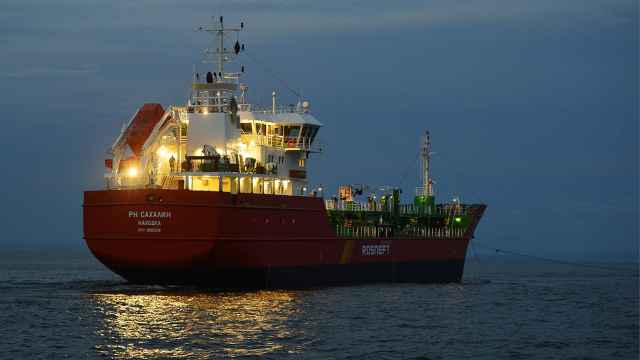New European Union air cargo rules that have ignited a row with Russia and jeopardized annual trade worth more than 13 billion euros ($18 billion) came into force on Tuesday, and are likely to heighten tensions between the EU and Moscow.
The EU is gradually tightening its security rules for air shipments, while Russia argues its airlines and airports need no extra checks, since they have already met safety standards set by a United Nations aviation body.
Moscow has threatened to retaliate by imposing additional security requirements on cargo shipments from the EU, a move that could ground air trade between the two markets.
Air carriers flying cargo into the EU from Russia are now rushing to secure extensions from European authorities and say they are caught in the middle of a political dispute. Several Russian airlines said they were continuing cargo shipments to Europe as normal on Tuesday.
Relations between the EU and Russia have soured dramatically over the Ukraine crisis and Moscow's annexation of Crimea. The tension has also worsened a trade dispute over pork exports to Russia from the 28-member bloc.
According to the cargo rules, from July 1 airlines shipping cargo into the EU must have their security procedures verified by an EU-accredited expert at each airport they use outside the EU, unless they receive an extension of up to six months from EU officials or their country is exempt from the rules.
The main sticking point between Brussels and Moscow is a so-called "green list" of countries which do not need extra checks because their security standards are considered exacting enough. Russia has so far not made the list.
Green List
Russia has been pressing for inclusion on the green list of about 10 countries, including the U.S. and Japan. The EU has yet to make a decision.
Moscow says it observes security standards set by the International Civil Aviation Organization, or ICAO, a UN agency, and that should be enough to guarantee its inclusion.
"We don't see the necessity to reconfirm once again adherence to implementation of the measures," Vladimir Chizhov, Russia's ambassador to the EU, told Reuters by e-mail, referring to the ICAO standards. "Russia does not intend to undertake additional inspections."
A spokesman for Russia's Transportation Ministry said Russian officials had sent a letter to the European Commission suggesting another round of talks but had not yet received a reply. The European Commission, however, said it had no knowledge of the letter.
Last week, an EU transport official said the EU was "ready to work with partner countries to smooth the implementation of the program … and in some cases to accept small changes to the rules." It was not immediately clear what form these changes could take.
Caught in the Middle
Airlines complain they have been placed in an unfair position and can do little to influence the high-level dispute between Russian and EU officials.
"Carriers should not be caught in the middle of political and technical disagreements," said Geert Scion, a spokesman for the Association of European Airlines, a lobby group.
Volga-Dnepr, a major Russian cargo airline group, said its subsidiary Atran had already received a deferral of the additional EU security checks. It was still preparing the necessary documents for its other subsidiaries.
"Halting air cargo transit to Europe and back to Russia, which forms a significant part of Volga-Dnepr's business, could cause serious damage not only to the company but also to a whole series of sectors of the Russian economy," it said.
Aeroflot, Russia's largest airline, declined a request for comment. A source at the airline, however, said that cargo shipments were continuing as usual as of Tuesday.
Transaero, another Russian carrier, said in a statement that it had received clearance from Spanish experts to ship freight into the EU from four Russian airports for the next five years. It said the approval process took several years.
Russia is the EU's eighth most important air freight partner. Annual traffic between the two has been growing 16 percent over the last five years, according to the EU executive. The EU imported 4.5 billion euros ($6.2 billion) worth of Russian goods by air in 2013 and exported goods valued at 8.6 billion euros ($11.8), data from the EU's statistics office show.
The new rules were introduced in response to a foiled terrorist plot to ship bombs disguised as printer cartridges from Yemen to the U.S. via the EU in 2010.
See also:
A Message from The Moscow Times:
Dear readers,
We are facing unprecedented challenges. Russia's Prosecutor General's Office has designated The Moscow Times as an "undesirable" organization, criminalizing our work and putting our staff at risk of prosecution. This follows our earlier unjust labeling as a "foreign agent."
These actions are direct attempts to silence independent journalism in Russia. The authorities claim our work "discredits the decisions of the Russian leadership." We see things differently: we strive to provide accurate, unbiased reporting on Russia.
We, the journalists of The Moscow Times, refuse to be silenced. But to continue our work, we need your help.
Your support, no matter how small, makes a world of difference. If you can, please support us monthly starting from just $2. It's quick to set up, and every contribution makes a significant impact.
By supporting The Moscow Times, you're defending open, independent journalism in the face of repression. Thank you for standing with us.
Remind me later.





